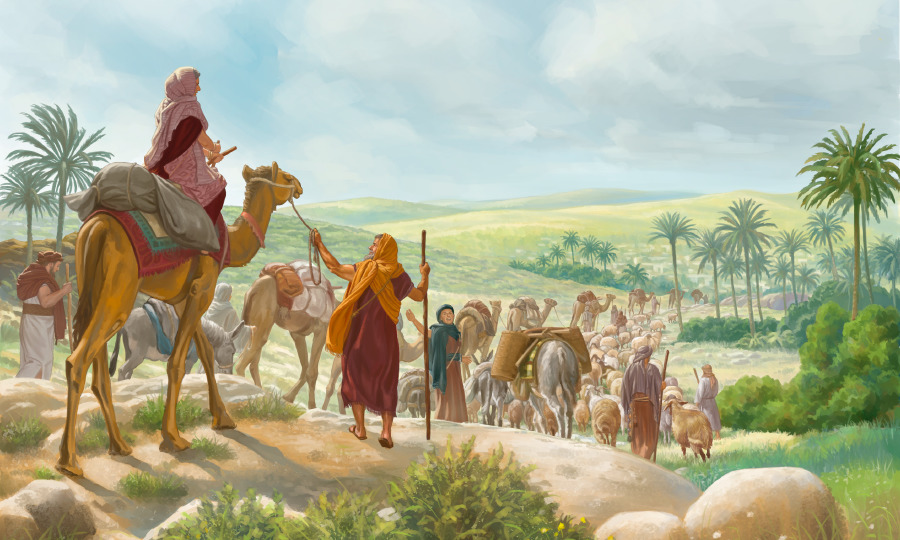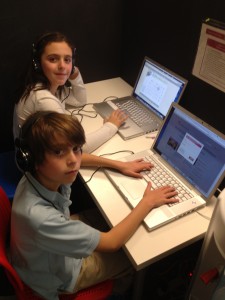#56.5 Abraham, Sarah, & Lot
In this lesson you will read part of the story of Abraham, Sarah, and Lot. You will discuss why it’s important for us to stand up for and speak out about the things we think are important. You will also become familiar with first part of the Amidah (the Avot v’Imahot) and discuss why it might be important to think about our Jewish ancestors as we pray.
#1 READ: Abraham, Sarah, and Lot
God said to Abraham: “Leave your father’s house. Go to the land I will show you. I will bless you and make you into a great nation.” And Abraham did as God commanded.
Abraham and Sarah, his wife, crossed the river and started out for the Land of Canaan. Abraham’s nephew, Lot, went with them. They took their sheep and their cattle and all that they had.

When they arrived in Canaan, God said to Abraham, “This is the land I promised to you. Your people will live in this land forever.” And Abraham set up his tent and thanked God.
The sheep and the cattle gave birth to lambs and calves, and the herds grew. Soon it was hard to tell which animals belonged to Abraham and which belonged to Lot. The shepherds began to quarrel with one another.
Abraham said to his nephew Lot, “Let there be peace between us and among our shepherds. Choose whatever part of the land you want, and I will take the rest.” Lot took the green grassy land near the city of Sodom, beside the Jordan River. He left the brown, stony hills of Canaan for Abraham. They hugged and went their separate ways.
God spoke again to Abraham. “Sarah will soon have a child,” God said. Now Sarah was in the door of her tent listening, and she began to laugh. “Why do you laugh?” God Asked.
“You know I am too old to have a child,” Sarah said. But God answered, “Have faith. Nothing is too difficult for God!” And it was so. In nine months time, Sarah gave birth to a baby boy. Abraham and Sarah called the boy, Isaac, which means “child of laughter.”
God said to Abraham, “People in the valley near the Jordan River are constantly choosing to do the wrong thing. I will destroy the cities of Sodom and Gomorrah.”
But Abraham spoke up, saying, “You are the God of Justice. Will you destroy good people along with the wicked people?”
God said, “If I find fifty innocent people, I will not destroy the cities.”
Then Abraham said, “Forgive me for speaking my heart, but what if You find thirty innocent people? Won’t You save the cities for the sake of thirty good people?” And God agreed.
Then Abraham said, “Dear God, what if there are only ten innocent people? Won’t You save the cities if there are ten good people?”
God said, “If I find ten good people, I will save the cities.”
But God could not find ten innocent people in the cities of Sodom and Gomorrah. Only Lot and his family were good. God said to Lot, “I must destroy these wicked people. But I will save you and your family. Run away quickly. And whatever you do, do not look back.”
Then Lot took his two daughters and his wife, and they ran away from the city of Sodom. The heat of the fire and the sound of the burning chased them from the valley into the hills. As they reached the top of the hill, Lot’s wife turned and looked back.
In the wink of an eye, Lot’s wife was turned into a pillar of salt. But Lot and his daughters were saved.
In this way, God remembered the promise made to Abraham. God destroyed the wicked people, but the good people God saved.
#2 WATCH: Parashat Vayera – Abraham Speaks Up
#3 WATCH: Sarah’s Song
#4 READ & DISCUSS: The Amidah – Connecting with our Ancestors
”The Amidah is the centerpiece of Jewish worship, an all-encompassing prayer of praise, supplication and gratitude recited three times every day… On Shabbat, it shifts to language describing the day of rest…But regardless of when it is recited, every Amidah opens the same way.

The opening of the Amidah helps us enter the proper state of mind in offering this prayer, shifting our perspective from the narrow focus of our own limited experience to a wider lens that encompasses our place in the chain of Jewish lineage. We ask God to hear our prayer not on account of our own virtues, but because of God’s love of our ancestors. We pray that we have a fighting chance in God’s eyes because we are their descendants.”
(to read the full article by Rabbi Danielle Upbin click here)
#5 REVIEW AND RESPOND
Now that you have studied some interesting things about Jewish History, please respond to these top 4 questions. Good luck!
1. What are the names of the people who listen to God’s instructions to leave their homeland and go to the land of Canaan?
2. Abraham spoke up to God, asking God to spare the cities of Sodom and Gomorah if there were even 10 good people in the city. Have you ever spoken up to defend someone or yourself even though it was really hard?
3. Why do you think we have a whole prayer that talks about our Jewish ancestors? Is it important to remember people from our history? Why or Why not?

